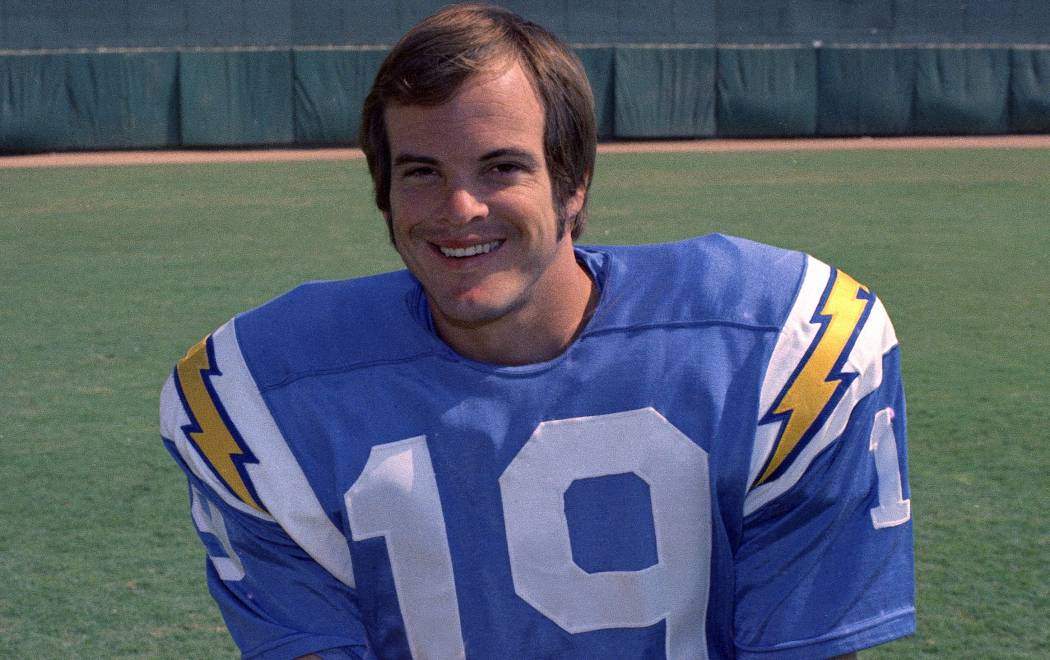Gold Jacket Spotlight: Grace, Speed Defined Lance Alworth

Through much of the American Football League’s existence, extended road trips were the price players and coaches paid for a bicoastal roster of teams and limited travel budgets.
Each year from 1960 to 1966, the Chargers traveled east for back-to-back-to-back games, typically Boston-Buffalo-New York City in some order to play the Patriots, Bills and Titans/Jets. They would remain on the East Coast for close to three full weeks, and after such a lengthy stay away from home, the last things players eager to return to the West Coast wanted to experience was a stressful flight.
One year, Mother Nature had other ideas, and Chargers tackle Ron Mix was certain the team was doomed.
“We were flying home from an Eastern road trip, and the plane hit some horrible weather,” he recounted in a story shared with the Pro Football Hall of Fame in a recent call. “It was shaking; it was plunging. I knew we were going to crash.
“Then I remembered Lance [Alworth] was on board and I relaxed. I told myself, ‘God wouldn’t kill Lance.’ I guess I was right; the plane landed safely. That’s how special he was.”
Teammates and opponents alike marveled at the skills Alworth – the featured Hall of Famer in the Gold Jacket Spotlight this week – demonstrated over 11 professional seasons.
His graceful footwork, lightning speed and remarkable leaping ability, combined with brown hair and big, brown eyes, soon earned him the nickname “Bambi.” Alworth said he never really cared for the moniker, but it stuck – as did most passes to his sure hands.
Sidelined for most of his rookie season (1962) after a freak injury in practice, Alworth caught only 10 passes in four games. They covered 226 yards, however, while producing three touchdowns and setting the stage for a breakout second season.
In 1963, he played all 14 games, catching 61 passes for 1,205 yards (19.8 average) with 11 touchdowns. The productivity helped the Chargers post an 11-3 regular-season record en route to the AFL title. In the championship game against Boston, Alworth caught four passes for 77 yards and scored from 48 yards out.
That season, he was named All-Pro for the first of six consecutive seasons and the UPI’s AFL Player of the Year. He was selected to his first of his seven consecutive AFL All-Star Games.
Alworth caught at least 52 passes each of the next six seasons, surpassing 1,000 yards each year. He led the league three times each in receptions, yards and touchdowns, with career-bests of 1,602 yards and 14 touchdowns in 1965 and 73 receptions in 1966.
He remained with the Chargers through the 1970 season, then spent two years in Dallas, where his role was limited more to blocking and driving defenders deep downfield than to catching passes. Still, he played on the Super Bowl VI championship Cowboys team and scored the first touchdown in their 24-3 victory over the Miami Dolphins.
Alworth finished his career with 542 receptions for 10,266 yards (a career average of 18.9 yards per catch) and 85 receiving touchdowns. He caught at least one pass in every AFL game he played, including a then-record 96 consecutive regular-season games – 105 in a row when including two AFL title games and his seven All-Star Game appearances.
He is the only player on both the AFL’s All-Time Team and NFL 75th Anniversary All-Time Team. He also was named to the NFL 100 All-Time Team and was elected to the Pro Football Hall of Fame in his first year of eligibility.
Al Davis, a Chargers coach when Alworth signed with the team, presented him for Enshrinement in 1978.
“The records did not tell what really sets him apart. He was beloved by his teammates, and I know. He was honored by his foes, and I know,” Davis said. “He was admired by the players because he had courage and he had an indomitable spirit and confidence and a killer instinct that made him the most feared player of our time.”
He also was the guy you wanted on the plane in rough weather.
Centennial Class of 2020 Autograph Session Presented by Panini
TICKETS GO ON SALE THURSDAY, JUNE 10 AT 10 AM EDT
NFL and BCFHOF Host Inaugural General Manager Forum and Fourth Annual QB Coaching Summit
Events aim to strengthen the coaching and personnel development pipeline across the league.

